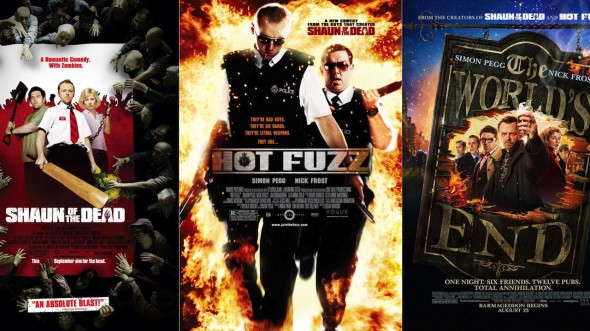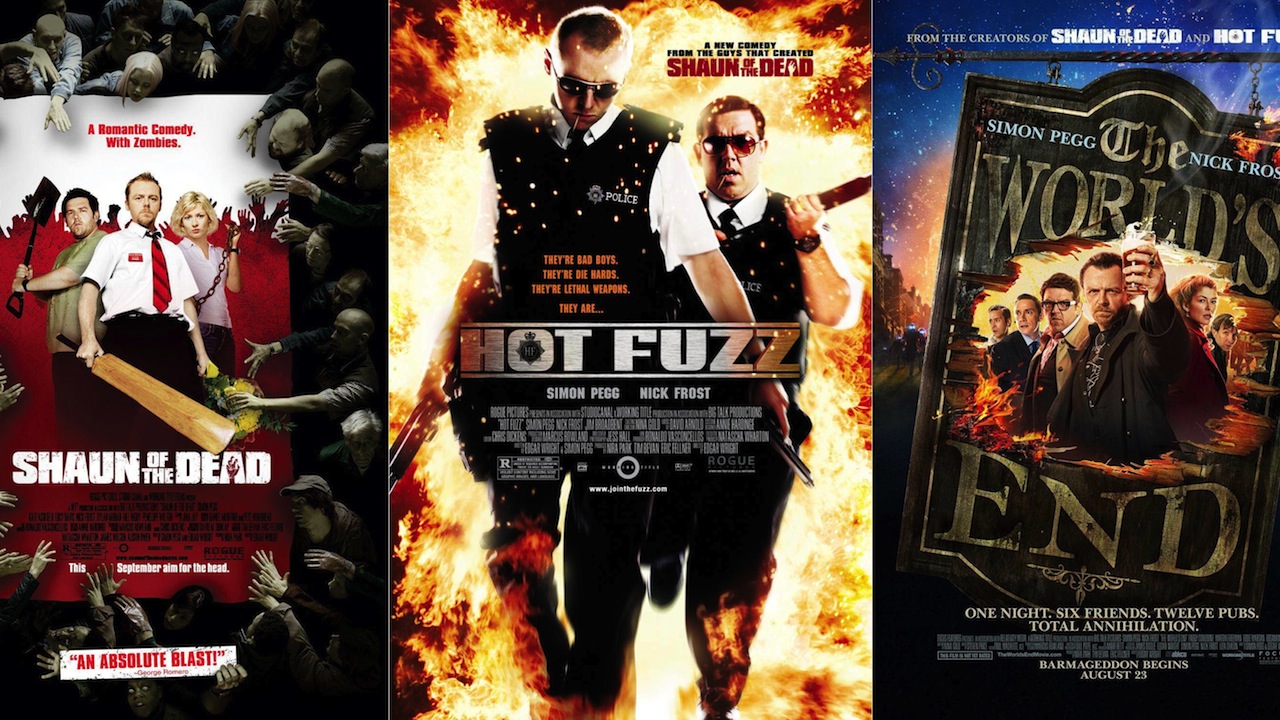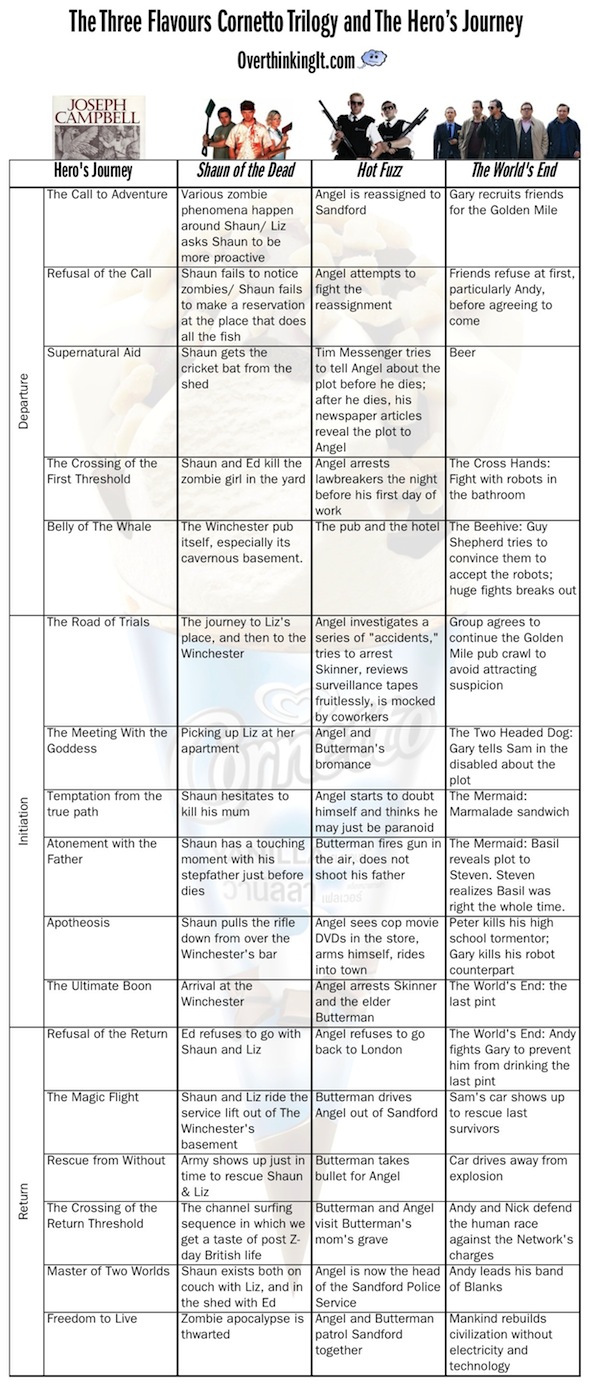
Shaun of the Dead. Hot Fuzz. The World’s End. These movies make up the Three Flavors Cornetto Trilogy, and they share more in common than the creative team of Simon Pegg, Nick Frost, and Edgar Wright.
They all tell the story of the Monomyth, otherwise known as the Hero’s Journey:
A hero ventures forth from the world of common day into a region of supernatural wonder: fabulous forces are there encountered and a decisive victory is won: the hero comes back from this mysterious adventure with the power to bestow boons on his fellow man.
-Joseph Campbell, The Hero with a Thousand Faces
Not familiar with this concept? Long story short, it’s a narrative structure that’s shared by many of our most memorable stories, from Gilgamesh to Star Wars. Some follow this structure on purpose; others by accident. Take a few moments to review the Wikipedia article and orient yourself to the seventeen stages. If you’re still a little fuzzy about what these stages look like in modern movies, check out this mapping of the Star Wars and Matrix trilogies to these stages as well.
Now, are you ready to Cross the Threshold and see how this maps to the Cornetto Trilogy? Probably not, because this is pretty insane. But here it is anyway (click for even larger version):
A few important things to keep in mind while reading this:
- The story elements don’t neatly follow the chronological order of the seventeen steps of the Hero’s Journey.
- This is no exact science. There may be better ways to map the story elements of the three movies to the seventeen steps.
- This is all probably not an accident. Director Edgar Wright filed a post on his blog about wanting to include a highly self-aware scene in Scott Pilgrim Versus the World in which Scott describes his own Hero’s Journey. He also name checks Joseph Campbell and The Hero with a Thousand Faces in this post.
So what this all mean? In a nutshell, the Hero’s Journey effectively functions as a satirical element of these movies. Part of the satire may be in calling out the frequent usage of the Hero’s Journey in genre movies, but to me, most of the satire lies in the movies’ implicit reminders that achieving self-actualization and escaping from the mundanity of daily life is actually harder than what we see in these genre movies. Lacking a call to adventure, a crossing of a threshold, or an ultimate boon, we have no structure to defeat the real forces of conformity and mundanity in our lives. They may not be zombies, psychotic villagers, or robots, but they’re real, and that makes them more fearsome enemies than anything a storyteller can throw against a hero.
Readers: what do you think? Do you have any suggestions for better ways to map the movies’ plot points to the Hero’s Journey? Do you think the Hero’s Journey acts as a satire in the Cornetto Trilogy, or is it just a convenient way to tell a good story? Let me know in the comments!
Special thanks to Fenzel and Stokes, who came up with this idea on the Overthinking It Podcast, and Stokes, who filled out most of the steps for Shaun of the Dead.


Smart, succinct… nothing to add really.
I’m just commenting to say that this line is brilliantly written: “Lacking a call to adventure, a crossing of a threshold, or an ultimate boon, we have no structure to defeat the real forces of conformity and mundanity in our lives.”
The Hero’s Journey is a trope that has badly outlived its usefulness; it’s become such an over-referenced cliche that it usually obscures more than it explains. It was never meant to be a one-size-fits-all explanation for the nature of stories or narrative, or as an argument that there’s somehow a limited number of stories. And while it has served in the past as a useful way to discuss some (some) traditional mythologies, it’s become so misrepresented and misunderstood that I think there’s little use in mapping it onto stories now.
No it shouldn’t be a one size fits all template. But neither should “3 act structure”, “protagonist/antagonist”, or “linear storytelling”.
They are however common materials used by storytellers, both intentionally and subconsciously. So I’d argue that “mapping it onto stories” from an analytic perspective is worth doing… if it’s applicable.
The thing I’m indecisive about is whether it’s an aid to writers to be as hyper-aware of this particular framework as they have become in recent decades…
I might say that it’s a shackle on good writers, and a crutch for bad ones; but in my experience good writers will write well, and bad ones will write badly.
I might say that it’s a lazy way out of creating fresh work; but examples like the 3 mentioned here show that importing familiar tropes provides freedom (telling a “stock” storyline CAN allow creative power to be redirected to character etc).
So yeah, generally undecided… but I WOULD like to see “bad uses” of “Hero’s Journey” get called out for it more often.
I might say that it’s a lazy way out of creating fresh work; but examples like the 3 mentioned here show that importing familiar tropes provides freedom (telling a “stock” storyline CAN allow creative power to be redirected to character etc).
@Rambler, you hit the nail on the head with this. I think this is precisely what Wright/Pegg/Frost are trying to accomplish. That and a healthy dose of wish-fulfillment, of course: they’re taking boring versions of themselves and allowing them to be self-actualized in these grandiose adventures with high stakes and trials and whatnot.
@Freddie: I understand your complaints about the over-usage of this sort of analysis. At its worst, it’s just a game that nerds play with themselves to make themselves feel clever and detached from stories that they’re actually quite invested in. But for all the reasons I’ve outlined above, I think this is still a useful lens of analysis for this trilogy. As opposed to movies with far less artistic intentionality.
Which brings me to those “bad uses” of the Hero’s Journey. What are some examples of that, in terms of A) storytellers using it as a writing crutch and B) nerds using it as an analysis crutch?
Can I just recommend this article ? There’s a bunch of examples on the misuses of Campbell and the Hero’s Journey
https://filmcrithulk.wordpress.com/2011/10/06/hulk-explains-why-we-should-stop-it-with-the-hero-journey-shit/